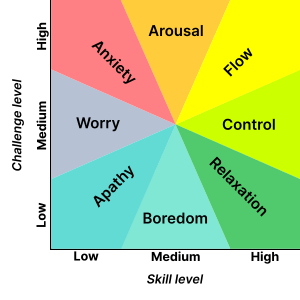Worry facts for kids
Worry is a feeling that makes you feel uneasy or nervous about something. It's like having a knot in your stomach because you're thinking about a real or even an imagined problem. Most people feel worried sometimes, and usually, it's not a big deal. In fact, a little bit of worry can actually be helpful! It might make you prepare better for a test or be more careful when crossing the street.
Contents
What is Worry?
Worry is a natural human emotion. It's a way your brain tries to prepare you for possible challenges. When you worry, your body might feel a bit stressed. This can include feelings like anxiety or concern. Anxiety is a strong feeling of fear or nervousness. Concern is a feeling of care or interest about something.
Why Do We Worry?
People worry for many reasons. Sometimes, we worry about things that are happening right now, like a school project due tomorrow. Other times, we worry about things that might happen in the future, like a big sports game next week. Our brains are always trying to keep us safe, and worrying can be part of that process.
When Worry Can Be Helpful
Believe it or not, worry isn't always bad! A small amount of worry can:
- Help you plan ahead: If you worry about forgetting your homework, you might pack your bag the night before.
- Make you more careful: Worrying about getting hurt might make you wear a helmet when biking.
- Motivate you: Worrying about a test might make you study harder.
This type of worry is like a warning system. It tells you to pay attention and take action.
When Worry Becomes a Problem
Sometimes, worry can become too much. If you worry all the time, or if your worries are very strong, it can make you feel bad. This might happen if you:
- Can't stop thinking about your worries.
- Feel worried about things that are unlikely to happen.
- Have trouble sleeping or eating because of worry.
- Avoid doing fun things because you're too worried.
If worry starts to get in the way of your daily life, it's important to know that there are ways to get help.
How to Manage Worry
If you find yourself worrying a lot, here are some things that can help:
- Talk about it: Share your worries with a trusted adult, like a parent, teacher, or counselor. Talking can make worries feel smaller.
- Write it down: Sometimes, writing down your worries can help you understand them better and feel less overwhelmed.
- Stay active: Doing physical activities like playing sports or going for a walk can help reduce stress and worry.
- Practice relaxation: Try deep breathing exercises or listening to calm music.
- Focus on what you can control: Some things are out of your control, and that's okay. Focus your energy on what you can change or prepare for.
- Limit news and social media: Too much information, especially about upsetting events, can increase worry.
Images for kids
-
A picture from the Ramayana showing Rama worried about his wife Sita, being comforted by his brother Lakshmana.
-
A 17th-century painting by Guido Reni showing feelings of sadness and worry.
See also
 In Spanish: Inquietud para niños
In Spanish: Inquietud para niños





